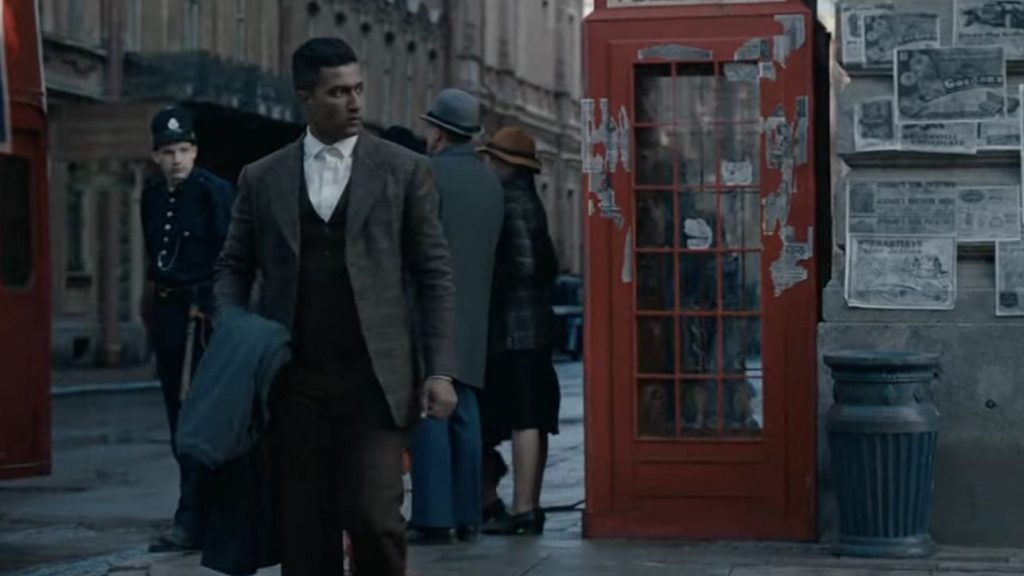Shoojit Sircar’s Sardar Udham (2021), currently streaming on Prime Video, is that unique Indian biopic that delves deep into the psyche of its subject. The film provides a fascinating exploration of the will and determination of a young boy whose dream in life is to be known as a revolutionary for India’s freedom movement. Hearteningly, Sardar Udham‘s treatment is miles away from the loud, jingoistic approaches of the current crop of ‘Nationalist’ films that capitalise on cinema for political gain. In fact, Sircar tactfully crafts a sensitive tale of vengeance born out of a tragic moment of Indian history, the Jallianwala Bagh Massacre of 1919.
Sardar Udham opens with the release of Udham Singh (Vicky Kaushal), also known as Sher Singh, from the central jail of Mainwali, Punjab in 1931. He is informed by one of the members of the Hindustan Socialist Republican Association (HSRA) that all their comrades are either imprisoned or have been shot dead by the British government. The HSRA movement for the Independence of India is all over. It is suggested that Udham escape to London with a fake passport. Through a series of flashbacks and flashforwards, we are informed that Udham grew up in an orphanage with his brothers. We also discover how Bhagat Singh (Amol Parashar) helped the young Udham shape his political ideologies and motivations. And since 1933, Udham has entered London several times using different aliases and has constantly shifted his residence in the UK every six months. At the same time, he has tried to organize an international network of rebels across Europe. Udham obtains a local peddler’s job licence working odd jobs and gets employed as a servant at the house of Micheal O’Dwyer (Shaun Scott). O’Dwyer had served as the Lieutenant Governer of Punjab from 1913-1919 and supported General Reginald Dyer’s genocide at the Jallianwala Bagh. He also is Udham’s target. However, Udham lets go of two instances where he had the opportunity to kill O’Dwyer. Because then it would be a case of a worker killing his employer thereby bringing the entire community of workers under suspicion. He prefers to execute O’Dwyer in public so that the killing can be described as a solo rebellious act of an Indian freedom fighter. In 1940, Udham finally succeeds and kills O’Dwyer. He is subsequently arrested, convicted for murder and hung…
Sircar grabs our attention right from the beginning of the film and as the narrative progresses, the dramatization of the various events makes us invest deeply in the character of Udham Singh. It also helps us to understand his motivations as they are revealed little by little, layer by layer. The screenplay effortlessly shuffles between the past and present and retains a strong grip on its storytelling without having to resort to typical melodramatic tropes. A cinematic tour-de-force is the unforgettable depiction of the brutal and horrific massacre that took place at the Jallianwala Bagh on the Vaisakhi day of 1919. The entire sequence not only hits us hard, it justifies the reason for the metamorphosis of a young cotton mill worker into a freedom fighter burning with a desire for revenge. While the film has its share of highs, there are the self-indulgent bits that do rackle. The ‘entire ‘free speech’ episode by a drunken Udham is redundant. The narrative also suffers from adding what seem to be too many insignificant details that hamper the momentum and flow of the film. Thankfully, it all falls into place by the end.
The performances enhance the film further. The British actors, through their flawless acts, reveal
Technically, the film excels in all the departments. One has to first and foremost speak of the meticulous production design with a strong eye for detail by Dmitriy Malich and Mansi Dhruv Mehta. The Visual Effects are superb in helping to recreate the architecture, landscapes and interiors of London in the 1930s along with the rustic environment of the Amritsar of undivided Punjab. The evocative cinematography by Avik Mukherjee makes remarkable use of framing and lighting, beautifully setting up the tone and mood of the film. The sound design by Nihar Ranjan Samal and Dipankar Chaki creates an aural world that heightens the dramatic conflicts and supports the emotional graph of the film. The pacing and rhythm of the scenes created by Chandrashekhar Prajapati are seamless yet precise handling multiple timelines with ease. However, the extraneous length of the film does tell at times. The background score of the film by Shantanu Moitra helps greatly in not only evoking the emotions within the scenes but also defining the tragic dimensions of the events that occur on-screen.
Finally, Sardar Udham captures the spirit and psychology of its character perfectly through a story well-told. It also escapes the trappings of being a hagiographic exercise – the bane of most Indian biopics. And that itself is one of its biggest triumphs.
Hindi, Drama, Biopic


